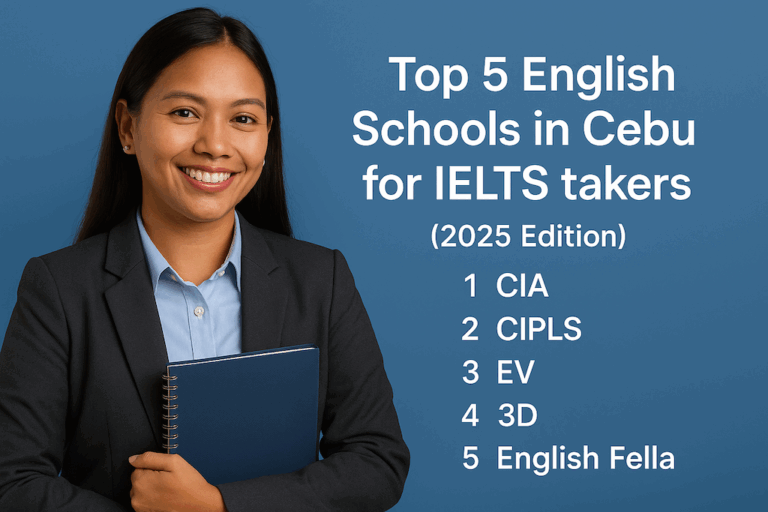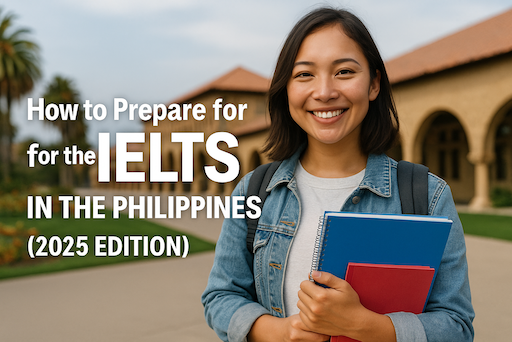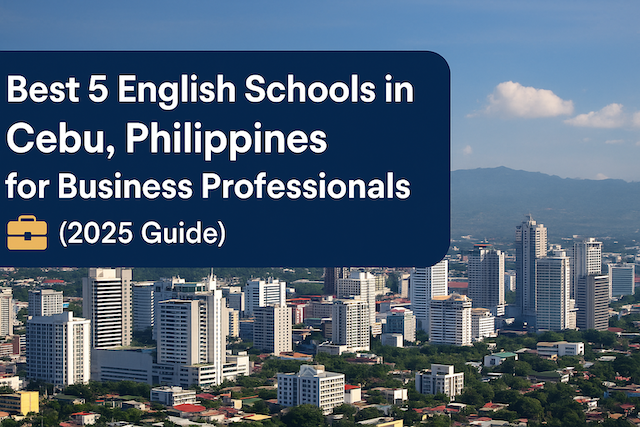Is It Safe to Study English in the Philippines in 2025?
Contents
- 1 Is It Safe to Study English in the Philippines in 2025?
- 2 Section 1: Understanding the General Safety Situation in the Philippines (2025 Update)
- 3 Section 2: Top ESL Cities and Their Safety Profiles
- 4 Section 3: School-Level Safety Measures and Student Protection
- 5 Section 4: Real Safety Concerns & How to Stay Smart in the Philippines
- 6 Section 5: Cebu vs. Other ESL Destinations – Which Is Safer?
- 7 Section 6: Safety Measures at ESL Schools in the Philippines
- 8 Section 7: Tips for Staying Safe While Studying in the Philippines
- 9 Section 8: How Parents Can Feel Assured When Sending Their Child to the Philippines
- 10 Section 9: FAQ – Safety & Studying English in the Philippines in 2025
- 10.1 ❓Q1: Is Cebu safe for foreign students in 2025?
- 10.2 ❓Q2: Is the Philippines politically and economically stable right now?
- 10.3 ❓Q3: Are ESL schools in the Philippines properly regulated?
- 10.4 ❓Q4: What about healthcare access in case of emergencies?
- 10.5 ❓Q5: Can my group classes be converted into 1-on-1 classes for safety or learning comfort?
- 10.6 ❓Q6: What about safety for minors and teen students?
- 10.7 ❓Q7: Do I need a visa to study English in the Philippines?
- 10.8 ❓Q8: Are there long-term visa options for retirees or older learners?
- 11 Section 10: Conclusion – Why the Philippines Remains a Top Choice for English Study in 2025
Is It Safe to Study English in the Philippines in 2025?
If you’re considering studying English abroad in 2025, the Philippines might already be on your radar. Known for its affordable tuition, warm hospitality, and immersive English-speaking environment, the country attracts tens of thousands of ESL (English as a Second Language) students each year. However, one question often lingers in the minds of students and parents alike: “Is it really safe to study English in the Philippines in 2025?”
Safety concerns are valid—especially when moving to a foreign country for the first time. From sensationalized media reports to outdated travel advisories, misconceptions can create unnecessary anxiety. But the reality on the ground is often very different from what you might imagine.
In this comprehensive guide, we’ll explore the current safety situation in the Philippines, including up-to-date 2025 insights on crime, health, and infrastructure. We’ll also delve into specific ESL destinations like Cebu, Manila, Baguio, and Davao, examine how language schools ensure student safety, and hear directly from international learners who have studied in the country.
Whether you’re a first-time traveler, a concerned parent, or an agency doing research for your clients, this article will provide everything you need to make an informed, confident decision about studying English in the Philippines in 2025.
Section 1: Understanding the General Safety Situation in the Philippines (2025 Update)
The Philippines, an archipelago of more than 7,000 islands, has long been a popular travel and study destination in Southeast Asia. But how safe is the country for international students, especially in 2025?
📊 Latest Global Safety Rankings (2025)
According to the Global Peace Index 2025, the Philippines ranks mid-tier globally, with notable improvements in urban safety, healthcare access, and digital infrastructure. While the country still faces isolated security issues in specific southern regions like Mindanao, major ESL destinations such as Cebu, Manila, Baguio, and Davao remain largely safe and welcoming to foreigners.
🚫 Common Misconceptions
Many concerns stem from headlines involving political instability, natural disasters, or regional conflicts. However, these events are often exaggerated or geographically limited. It’s important to understand that such issues rarely affect ESL students, especially those enrolled in well-managed institutions within safe zones.
👮 Police and Government Support
The Philippine National Police (PNP) has taken significant steps to protect tourists and international students, including:
-
Establishing Tourist Police units in major cities
-
Increasing CCTV surveillance in public areas
-
Improving emergency response hotlines (e.g., 911 services)
-
Collaborating with local embassies and language schools on student safety protocols
In Cebu, for example, many ESL schools coordinate closely with local law enforcement to ensure that students are safe both on and off-campus.
🏙️ Urban vs. Rural Safety
Urban areas where ESL schools are concentrated—like Cebu City, Makati, and Quezon City—tend to be more secure due to better lighting, public transport, and visibility. These places are also full of other international students, tourists, and expats, making them vibrant, cosmopolitan environments ideal for studying and socializing safely.
Section 2: Top ESL Cities and Their Safety Profiles
When choosing where to study English in the Philippines, safety is a top priority. Fortunately, the country’s most popular ESL destinations offer secure environments, strong community support, and reliable infrastructure. Let’s take a closer look at the safety profiles of the top cities.
🏝️ Cebu City: The Queen City of the South
Cebu City is one of the safest and most student-friendly cities in the Philippines. Known for its balance of urban convenience and beachside charm, it hosts numerous international language schools, including 3D ACADEMY, QQEnglish, EV Academy, and more.
Safety Highlights:
-
Low crime rate in tourist and school areas like IT Park, Lahug, and Banilad
-
Well-lit and patrolled main streets and malls
-
Many schools offer 24/7 security, CCTV, and student ID access
-
Friendly locals and an active expat/student community
Transportation is safe and accessible via Grab, MyBus, and jeepneys in central areas.
🌆 Manila (Makati / Ortigas / BGC)
While Metro Manila has a mixed reputation, key ESL zones like Makati, Ortigas, and Bonifacio Global City (BGC) are well-developed and secure.
Safety Highlights:
-
International-level infrastructure and private security in business districts
-
Abundance of upscale shopping malls, cafés, and study spaces
-
Schools often located inside gated communities or secure buildings
Still, students are advised to avoid wandering into unfamiliar neighborhoods at night and to use trusted transportation apps.
🌄 Baguio City: The City of Pines
Located in the northern highlands, Baguio is a cooler, quieter city with a large student population and a reputation for being one of the safest places in the Philippines.
Safety Highlights:
-
Strong community culture and student-friendly neighborhoods
-
Minimal street crime, especially in areas around universities and schools
-
Popular among Japanese, Korean, and Vietnamese ESL students
Baguio is ideal for those who prefer a peaceful, study-focused environment.
🌴 Davao City: Discipline and Order
Davao has a long-standing reputation for strict law enforcement and cleanliness. Though less popular than Cebu or Manila for ESL, it’s rising in popularity due to its safety and affordability.
Safety Highlights:
-
Strict anti-crime laws and curfews enforced
-
High police visibility and effective local governance
-
Affordable living costs and less crowded urban spaces
Students who prioritize safety and serenity often consider Davao a hidden gem.
Section 3: School-Level Safety Measures and Student Protection
While city-wide safety is important, the real sense of security for international students comes from the protective measures implemented within the ESL schools themselves. Philippine language schools, especially those that cater to global students, have invested heavily in campus security and student well-being. Here’s what you can typically expect:
🛡️ 24/7 Campus Security
Most reputable ESL schools in the Philippines operate within secured buildings or gated compounds. This includes:
-
24/7 security guards stationed at entrances
-
CCTV surveillance in public and common areas
-
Check-in/out systems for students
-
Visitor screening processes
These systems are designed to monitor and prevent unauthorized access, ensuring students feel safe even during late-night study sessions or weekend stays.
🏨 Safe On-Campus and Partner Dormitories
Accommodation plays a huge role in safety. Top schools offer:
-
On-campus dormitories with restricted access
-
Partnered hotels or condos with vetted security
-
In-room safety features such as secure locks, emergency contact systems, and night curfews for younger students
At schools like 3D ACADEMY in Cebu, for example, students can choose to stay in high-quality dormitories or nearby hotels that meet the school’s safety standards.
👩🏫 Student Managers and Multilingual Support
To help international students adjust and navigate safely, schools provide:
-
Dedicated student managers, often multilingual, who can assist in emergencies
-
Safety orientations upon arrival
-
Guidance on where and how to travel safely in the local area
These managers serve as the first point of contact for health, safety, or personal issues and can coordinate with local hospitals or authorities when needed.
🏥 Access to Emergency Services and Medical Care
Many schools are located within 5–10 minutes of hospitals or clinics, and some schools:
-
Offer on-site nurse consultations
-
Maintain partnerships with nearby medical centers
-
Help students access travel insurance benefits when needed
Students can rest easy knowing that medical help is always nearby and easily accessible with the support of school staff.
Section 4: Real Safety Concerns & How to Stay Smart in the Philippines
While the Philippines is generally a safe and welcoming destination for English learners, like any country, it has its unique safety considerations. By understanding potential risks and learning how to avoid them, students can stay confident and secure during their stay.
⚠️ Common Risks (and How to Handle Them)
Here are some of the most commonly reported safety concerns — and practical ways to manage them:
| Risk | Details & Tips |
|---|---|
| Petty Theft | Pickpocketing can occur in crowded areas like jeepneys or local markets. Always keep valuables secure and use anti-theft bags. |
| Scams or Overpricing | Tourists may be quoted higher prices for taxis or souvenirs. Use Grab for transportation and always ask for receipts. |
| Traffic & Road Safety | Traffic in cities like Manila or Cebu can be chaotic. Use pedestrian overpasses and avoid crossing highways. |
| Weather-related Disruptions | Typhoons may affect travel plans between June and November. Keep emergency kits and follow school advisories. |
| Drinking Water | Tap water may not be potable. Most schools provide purified water dispensers or recommend bottled water. |
💡 Smart Safety Tips for ESL Students
Here are 6 proven safety habits every student should adopt:
-
Always Share Your Location
Use messaging apps to let friends or dormmates know your whereabouts, especially if going out alone. -
Use School-Recommended Services
Whether it’s a laundry shop or city tour, rely on services vetted by your school for safety and reliability. -
Avoid Isolated Areas at Night
Stick to well-lit areas and avoid walking alone after dark, particularly in unfamiliar neighborhoods. -
Use Grab or Registered Taxis
Ride-hailing apps like Grab are safer and more transparent than flagging down street taxis. -
Keep Copies of Important Documents
Store photos or scans of your passport, visa, and ID in your cloud storage. -
Join School Activities
Group tours and weekend outings organized by your school are a great way to explore while staying safe.
🧠 Cultural Awareness Helps Too
Understanding Filipino culture can also contribute to safety. For example:
-
Smiling and politeness are valued in everyday interactions.
-
If approached by a stranger, a friendly but cautious response is usually safest.
-
Avoiding confrontation and showing respect will go a long way.
By staying informed and alert, ESL students in the Philippines can enjoy their experience without unnecessary risk.
Section 5: Cebu vs. Other ESL Destinations – Which Is Safer?
When choosing where to study English abroad, safety is a top concern. So how does Cebu, Philippines, compare to other major ESL destinations like Malaysia, Thailand, or Malta?
Let’s break it down by key safety categories and real-world experiences.
🌍 Comparative Safety Overview
| Destination | Safety Score (Global Index) | Key Risks | Student Sentiment |
|---|---|---|---|
| Cebu, PH | Moderate | Petty theft, traffic, typhoons | Generally safe if smart |
| Bangkok, TH | Moderate | Scams, political protests, traffic | Safe with awareness |
| Kuala Lumpur | High | Pickpocketing, taxi scams | Safe in central areas |
| Malta | High | Minor theft, nightlife safety | Very safe and peaceful |
🔍 Takeaway: Cebu is comparable to many ESL destinations in terms of overall safety. With proper precautions, students feel secure during their stay.
🏝 Why Cebu Feels Safer for Many Students
Many students report that Cebu’s combination of:
-
Warm hospitality
-
Community-centered culture
-
Presence of many international students
creates a sense of comfort and belonging — especially for first-time travelers or solo learners.
In contrast, large urban hubs like Bangkok or Manila can feel overwhelming due to size and traffic, while Malta (though peaceful) can be costly and less culturally familiar to Asian students.
🏫 Safety Inside Language Schools
In Cebu — particularly at schools like 3D ACADEMY — safety is taken seriously:
-
On-site security personnel
-
24/7 staff presence in dormitories
-
Curfews and buddy systems for evening outings
-
Pre-screened tour operators for excursions
Students often say they feel safer inside a school campus in Cebu than in their home city.
🌐 Infrastructure & Technology Improvements
Cebu has made big strides in safety infrastructure:
-
Grab is widely available
-
Free Wi-Fi in malls and cafes makes communication easy
-
English proficiency among locals reduces misunderstandings in emergencies
In short, Cebu ranks among the safest ESL destinations — especially for students who follow school guidelines and use common sense.
Section 6: Safety Measures at ESL Schools in the Philippines
When choosing a language school abroad, safety protocols matter just as much as curriculum quality. Fortunately, ESL schools in the Philippines — especially in Cebu — have developed robust systems to protect students physically, mentally, and emotionally.
Here’s what you can expect in 2025:
🛡️ 1. 24/7 Campus Security
Most reputable ESL schools, including 3D ACADEMY, offer:
-
Round-the-clock security personnel
-
CCTV coverage in common areas
-
Secure entrances requiring student IDs or key cards
-
Visitor registration systems to track entry and exit
These measures ensure that only authorized people can access dormitories or classrooms.
🛏️ 2. Safe and Clean Dormitories
Student accommodations follow strict standards:
-
Daily or weekly housekeeping
-
Regular pest control
-
Shared or private rooms with locks
-
Emergency exits and fire safety tools in each floor
The environment is similar to a college dorm — comfortable, monitored, and stress-free.
🏥 3. Medical Support and Emergency Protocols
In case of illness or injury:
-
School nurses or medical liaisons are available
-
Tie-ups with local hospitals like Chong Hua or UCMed
-
COVID protocols (still in place for 2025): temperature checks, isolation rooms, optional vaccination support
-
Emergency evacuation drills conducted regularly
Students are guided step-by-step if emergencies occur — no need to feel alone or confused.
🧠 4. Mental Health and Emotional Safety
ESL schools are now more aware of student well-being:
-
Orientation programs for cultural adjustment
-
Staff trained in basic counseling support
-
Encouragement of peer interaction and language exchanges
-
Access to a student coordinator or life counselor
Many schools now also offer anonymous feedback systems, giving students a way to raise concerns safely.
📵 5. Digital and Personal Privacy
In 2025, tech security is essential:
-
Wi-Fi networks are secured and monitored
-
No use of surveillance in private rooms
-
Student records are protected by data privacy policies
-
Social media use guidelines to prevent cyberbullying
You’ll find that Filipino ESL schools treat both physical and digital safety with equal priority.
🧭 Bottom Line: Whether you’re a solo traveler, a beginner student, or a concerned parent, Filipino ESL schools in Cebu are designed to keep you safe, comfortable, and well-supported.
Section 7: Tips for Staying Safe While Studying in the Philippines
While the Philippines—especially Cebu—is generally safe for international students, it’s always wise to take proactive steps to ensure your own safety. Here are practical, easy-to-follow tips to make your study abroad experience even more secure and enjoyable in 2025.
👜 1. Be Street Smart
Cebu is a bustling city, and like any other urban area, petty crimes can occur in crowded places. To stay safe:
-
Avoid showing off expensive gadgets or jewelry
-
Carry your bag in front in busy areas like jeepneys or markets
-
Use apps like Grab instead of hailing taxis on the street
-
Don’t walk alone late at night in unfamiliar neighborhoods
Remember: most incidents can be avoided with common-sense awareness.
🏨 2. Choose Accredited Schools and Accommodations
Pick ESL schools with good reviews, licenses, and visible safety protocols. 3D ACADEMY, for example:
-
Conducts orientation sessions on safety, local customs, and emergency contact info
-
Offers secured dorms or partnerships with trusted hotels
-
Has staff support in multiple languages
Doing your research ahead of time pays off.
📲 3. Use Tech Tools for Safety
Leverage modern tech to keep yourself informed and connected:
-
Enable location sharing with trusted friends or family
-
Use Google Maps offline in case data runs out
-
Download emergency numbers and embassy contacts
-
Follow local news sources for weather or security alerts
Technology is your ally when navigating a new city.
💡 4. Learn Basic Local Etiquette
Safety is also about social harmony. Avoid misunderstandings or conflict by knowing:
-
Filipinos value respect and friendliness
-
Dress modestly when visiting churches or government buildings
-
Greet people with “po” or “opo” to show politeness
-
Don’t raise your voice in public or argue aggressively
Respect leads to smoother interactions—and more help when you need it.
🦠 5. Stay Healthy, Stay Safe
Safety isn’t just about crime—it’s also about your health:
-
Drink bottled or filtered water
-
Wash hands often or carry sanitizer
-
Keep your vaccinations up-to-date
-
Know your school’s health policy in case of illness
If you’re healthy, you’ll enjoy your time and focus on learning.
✅ 6. Trust Your Instincts
If something doesn’t feel right, it probably isn’t. Don’t:
-
Follow strangers offering “special deals”
-
Visit unsafe or off-limits areas without guidance
-
Be afraid to ask your school staff for help or clarification
Your safety starts with trusting yourself and acting accordingly.
💬 In short: A mix of street smarts, cultural respect, and school support will go a long way. The Philippines is welcoming, but your awareness ensures you make the most of it safely.
Section 8: How Parents Can Feel Assured When Sending Their Child to the Philippines
For many parents, sending a son or daughter abroad for language study can feel both exciting and stressful. Questions about safety, support, and cultural differences naturally arise. Fortunately, when choosing a reputable ESL destination like Cebu, Philippines, parents can find strong reasons for peace of mind—especially in 2025.
👩🏫 1. Established ESL Infrastructure
Cebu has been a top ESL hub for more than two decades, with thousands of international students attending each year. This has led to:
-
Well-developed schools with tested programs
-
Clear immigration procedures for student visas
-
Experienced staff who understand the needs of foreign learners
Reputation matters—and Cebu has built it over time.
🛡 2. Safe and Monitored Living Conditions
Top schools like 3D ACADEMY offer:
-
On-site dormitories with 24/7 security
-
CCTV-monitored facilities
-
Female-only floors and curfews for minors
-
Housekeeping and laundry services
These structured environments replicate the safety and comfort of home while nurturing independence.
🌐 3. Multilingual Support and Emergency Readiness
At most ESL schools in Cebu, students receive support in English and their native language. In case of emergencies:
-
Schools help with hospital arrangements
-
Guardians are informed immediately
-
Students are accompanied by staff for medical needs or police matters
This communication transparency helps parents stay informed and involved from afar.
📅 4. Regular Updates and Contact Channels
Schools today provide:
-
Weekly reports or progress updates
-
WhatsApp, Viber, or LINE access for fast communication
-
Dedicated student coordinators for each nationality
With real-time messaging and scheduled calls, the distance doesn’t feel as big.
🧭 5. Orientation and Cultural Adjustment Help
Upon arrival, students go through orientation programs covering:
-
Safety protocols
-
Local customs
-
Practical info (transportation, food, communication)
This helps reduce the “culture shock” and gives students more confidence from Day 1.
🧘♀️ 6. Affordability Means Longer, Stress-Free Stays
Because the Philippines offers low-cost yet high-quality education, parents can afford to:
-
Extend their child’s study period
-
Visit during the program
-
Send siblings together
This flexibility reduces financial stress and allows for better planning.
💬 In short: With the right school and preparation, studying in Cebu is not just safe—it’s a transformative experience that students and their families can feel good about.
Section 9: FAQ – Safety & Studying English in the Philippines in 2025
Here are some of the most frequently asked questions from prospective students and their families who are considering English study in the Philippines, especially Cebu, in 2025:
❓Q1: Is Cebu safe for foreign students in 2025?
✅ Yes. Cebu is considered one of the safest cities in the Philippines for international students. Areas around established ESL schools, like those in Lahug or Banilad, are well-developed and patrolled. In addition, most schools offer secure, on-campus dormitories with 24/7 security.
❓Q2: Is the Philippines politically and economically stable right now?
✅ The Philippines has seen steady economic recovery post-COVID, with strong tourism and BPO sectors. Political conditions in 2025 remain relatively stable, especially in tourist and education hubs like Cebu, far from any conflict-prone areas.
❓Q3: Are ESL schools in the Philippines properly regulated?
✅ Most reputable ESL schools are registered with the TESDA (Technical Education and Skills Development Authority) and comply with immigration standards for student visa extensions. Established schools also maintain strict codes of conduct and health policies.
❓Q4: What about healthcare access in case of emergencies?
✅ Cebu is home to several international-standard hospitals, such as Chong Hua Hospital, Cebu Doctors’ Hospital, and UCMed. Top schools also provide medical assistance and coordination for students in emergencies.
❓Q5: Can my group classes be converted into 1-on-1 classes for safety or learning comfort?
✅ Yes. At schools like 3D ACADEMY, students can upgrade their curriculum by converting group classes into 1-on-1 lessons. This allows for:
-
More personalized instruction
-
Better progress tracking
-
Reduced interaction with unfamiliar classmates (ideal for shy or cautious students)
Example upgrades:
-
General ESL → From 4 to 5 1-on-1 classes
-
Intensive ESL → From 5 to 6 1-on-1 classes
-
Platinum ESL → From 6 to 7 1-on-1 classes
❓Q6: What about safety for minors and teen students?
✅ Many schools offer:
-
Female-only dormitories or floors
-
Night curfews
-
Group activities supervised by staff
-
Clear rules against leaving campus alone
These measures give peace of mind to parents and ensure a safe learning environment.
❓Q7: Do I need a visa to study English in the Philippines?
✅ Yes, but it’s easy to get. Most students enter on a tourist visa and extend monthly at school with assistance. For longer stays (e.g., over 59 days), students also apply for an ACR I-Card.
❓Q8: Are there long-term visa options for retirees or older learners?
✅ Yes. The SRRV (Special Resident Retiree’s Visa) is an excellent option for those aged 50 and above who wish to stay long-term. With this visa, you can:
-
Stay in the Philippines indefinitely
-
Re-enter without needing a new visa
-
Even run a small business
This makes Cebu a popular destination for senior learners combining study with a relaxed retirement lifestyle.
Section 10: Conclusion – Why the Philippines Remains a Top Choice for English Study in 2025
As we move further into 2025, the Philippines—particularly Cebu—continues to stand out as one of the most accessible, immersive, and safe destinations for English learners worldwide. The country’s unique blend of native English fluency, affordability, tropical charm, and friendly culture makes it an ideal choice for students of all ages and backgrounds.
Whether you are:
-
A beginner looking for your first study abroad experience
-
A professional preparing for IELTS or TOEIC
-
A senior learner seeking a meaningful post-retirement journey
—Cebu offers a personalized learning environment that is hard to match elsewhere.
Safety, always a top concern for parents and students, is actively managed through community engagement, campus security, and school-led support systems. Institutions like 3D ACADEMY lead the way by providing secure dormitories, flexible class formats, and localized emergency assistance, ensuring your focus remains on learning—not worrying.
In short, studying English in the Philippines is not only affordable and effective—it’s also safe and welcoming in 2025. If you’re looking to combine English improvement with adventure, cultural exchange, and personal growth, Cebu might just be the perfect place to begin.







